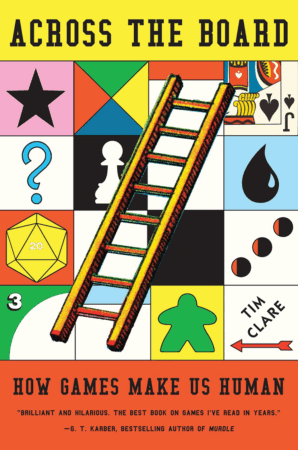It’s your move.
Shake the dice, spin the wheel, count the squares and move your plastic piece a little closer to a win. You absolutely love doing this — it’s oddly very exciting — but why? Is your favorite board game one of skill or chance or, as in the new book “Across the Board” by Tim Clare, maybe it’s an ancient and obsessive mix of both?
As a busy adult, you might not believe that you have many chances for play.
But think about it. Clare says that “tabletop games are… everywhere, played in pubs, cafes… churches and casinos, under bridges on flattened cardboard boxes…” You might’ve gone to Bingo this week, indulged a kindergartner with a pretend-loss, or enjoyed your weekly poker night. “Games,” he says, “are so ubiquitous… that we take them for granted.”
That wasn’t always so. At times throughout history, games were serious matters.
Thousands of years ago, dice were used for divine decision-making, prediction, and magic as well as for play but sometimes, the pieces weren’t all fun and games. In the 1700s in Sweden, when multiple people were involved in murder, a roll of the die had a more sinister meaning: killers who won the roll-off went to prison, those who lost the round were executed.
The first confirmed instructions for playing a game were found in a Sumerian tomb dating back thousands of years, while “the oldest positively identified board game,” called Mehen, is from ancient Egypt; today, games we play have distant similarities to both. Germans in the Middle Ages enjoyed drinking games. America’s first game manufacturer owed its success to a letter written by a little girl. D&D sprung somewhat recently from elaborate and “highly complex” war games but nobody knows exactly how old chess is; ditto for card games because of their too-easy destructibility. And, says Clare, there are more than fifty billion Pokémon cards floating around in the world since the game’s creation nearly thirty years ago…
The car’s packed, including swimsuits and flip-flops and the family’s new obsession. Game boards aren’t just for long winter evenings, as you’ll see in “Across the Board.”
Making the distinction between a sport and a game, author Tim Clare takes readers on a time-traveling romp across ancient tables and sweaty-handed dice rolls, through modern auditoriums full of plastic pieces and around potentially million-dollar game cards. This is fun, but it also works as a sort of nostalgia, making you remember the games you loved as a kid.
Board games are fleeting things, little more than cardboard and plastic, in most cases, but Clare argues that they matter. They can represent big-money, or a way to connect with someone, or “Several rings out,” games are related to other aspects of life. In a big surprise, he shows that they could be related to health, too.
“Across the Board” is a very interesting book that entertains and informs, and no board game enthusiast, dice lover, gambler, gamer, or quietly competitive player should be without it.
Find it. It’s your move.
“Across the Board: How Games Make Us Human” by Tim Clare
c.2025, Abrams Press
$28.00
234 pages




